Book contents
- Social Rights and the Politics of Obligation in History
- Human Rights in History
- Social Rights and the Politics of Obligation in History
- Copyright page
- Contents
- Contributors
- Acknowledgements
- 1 Not ‘Second-Generation Rights’
- Part I Religion, Markets, States
- Part II Race, Gender, Class
- 8 The Soviet Social
- 9 The Japanese ‘Welfare Society’: Social Rights in Action and the Seeds of the Precariat?
- 10 Liberation Theology, Social Rights and Indigenous Rights in Mexico (c.1965–2000)
- 11 The Unhappy Marriage of Gender and Socio-economic Rights in France
- Part III Social Rights in the Age of Internationalism
- Index
10 - Liberation Theology, Social Rights and Indigenous Rights in Mexico (c.1965–2000)
from Part II - Race, Gender, Class
Published online by Cambridge University Press: 11 January 2022
- Social Rights and the Politics of Obligation in History
- Human Rights in History
- Social Rights and the Politics of Obligation in History
- Copyright page
- Contents
- Contributors
- Acknowledgements
- 1 Not ‘Second-Generation Rights’
- Part I Religion, Markets, States
- Part II Race, Gender, Class
- 8 The Soviet Social
- 9 The Japanese ‘Welfare Society’: Social Rights in Action and the Seeds of the Precariat?
- 10 Liberation Theology, Social Rights and Indigenous Rights in Mexico (c.1965–2000)
- 11 The Unhappy Marriage of Gender and Socio-economic Rights in France
- Part III Social Rights in the Age of Internationalism
- Index
Summary
This chapter underscores the role of liberation theology in promoting social rights. The Second Vatican Council (1962–5) and the Catholic Church’s concern with social inequality and development inspired the liberation theology movement, which took these concerns still further. From the mid-1960s until the end of the century, a small but active and progressive sector of the Mexican Catholic Church engaged with liberation theology and played a significant role in advancing the cause of social, cultural and indigenous rights. Empowering communities at the grassroots level, they helped found lay Catholic organisations and collaborated with networks and institutions to establish new NGOs and social movements that began to assert their social, cultural and indigenous rights. This was the first time that Catholic Church leaders took a radical approach to social inequality and opposed the state. By the 1990s, the influence of liberation theologians in the Church hierarchy was on the wane, but their legacy has persisted in social movements throughout Mexico ever since.
- Type
- Chapter
- Information
- Social Rights and the Politics of Obligation in History , pp. 184 - 202Publisher: Cambridge University PressPrint publication year: 2022

